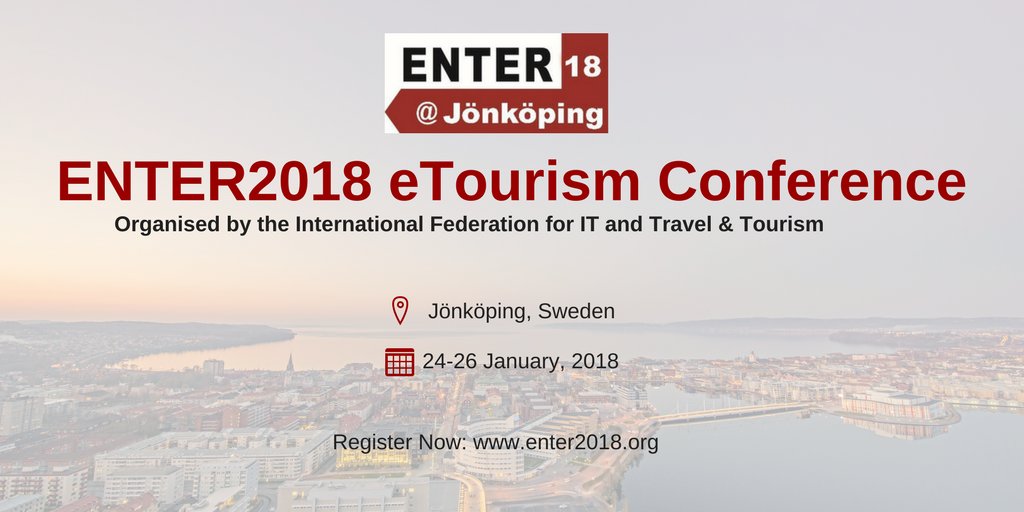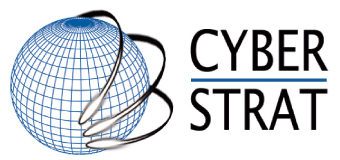ENTER2019 Discussed Key eTourism Trends: AI and Robotics
Let me share the latest Press Release from IFITT: 26 February 2019
ENTER2019, the leading eTourism conference organised annually by the International Federation for IT and Travel & Tourism (IFITT), was held this year in sunny Nicosia, Cyprus on 29 Jan – 1 Feb. Renowned for its topical debates, inspiring keynotes, and highly practical workshops, ENTER has brought together leading academics and industry professionals in travel and technology since 1994. Over the years the conference has firmly established its place as a platform showcasing cutting-edge research in eTourism and shedding light on current developments as well as future challenges in the space. “Organising ENTER forms a key part of IFITT’s activities and celebrates the Federation’s dedication to bringing value to society at large,” says Iis Tussyadiah, IFITT President.
One of the key themes at this year’s ENTER were artificial intelligence (AI) and robotics.
The emergence of increasingly powerful computing technology combined with ever more affordable prices has brought about new ways of doing business, effectively allowing forward-looking tourism companies to automate some – or all – of their routine front- and back-end tasks. Furthermore, recent advances in machine learning and big data analytics have made it possible to, not only make more accurate predictions and forecasts based on unstructured data, but to also continue learning from emerging behaviour in ways that have not been possible before.
Working at the forefront of these developments are Urška Starc-Peceny and Tomi Ilijaš from Slovenia-based Arctur Technologies. In an illuminating keynote entitled “Tourism 4.0,” Tomi outlined Arctur’s plans for bringing the tourism industry to the digital era once and for all. Using Slovenia as a nationwide “living lab”, Arctur is pioneering AI and blockchain technologies that completely change the way people consume travel experiences. At the core of their innovative approach is a novel credit-based system for tourists. Travellers seeking visas to Slovenia are granted a certain amount of personal credits upon entry. These can be used to purchase goods and services from small, independent producers spread across the country. The idea is to boost local economies by encouraging travellers to seek experiences off the beaten path and explore what the country has to offer more holistically, whilst simultaneously facilitating safer transactions free from exchange fees. Transactions are made safe by the clever use of distributed ledger technology.
In addition to clever business applications, AI and robotics were also very much front and centre in the academic debate of the conference. For example, Stanislav Ivanov of Varna University of Management, discussed the macro-economic and political implications of robotised societies at large. In his view, the case for increased robotisation is clear: our economies rely on continuous growth, but because of falling birth-rates combined with longer life expectancies, global productivity in services is falling simply due to lack of hands. “As societies, we’re faced with two choices, really: either we need to start making more babies, or we need to implement robotics where possible in order to do more with less people. Telling people how many children they can and should have has never worked out well; robots simply make more sense, both short- and long-term,” says Stan.
But how exactly should we start robotising our lives?
Where to begin, and why? The impending robot revolution raises countless ethical issues which need to be addressed sooner rather than later according to Marianna Sigala of University of South Australia. In her thought-provoking presentation, Marianna voiced concerns over job displacement, biased algorithms, increased surveillance in the pretext of hyper-personalised products and services, as well as the gradual disappearance of “humanness” in travel and tourism. A workshop facilitated by Ulrike Gretzel of Netnografica picked up on the latter and further illustrated the ways in which AI and robotics are already changing interactions with services through type/touch, voice, and gesture, in relative order of importance.
Naturally, these new ways of interaction give businesses more opportunities to get to know their customers better, leading to more optimised service offerings. Also, the abundance of data might also unlock new knowledge and lead to innovations that would otherwise go unnoticed. Although, there are several examples of AI-mediated experiences gone wrong, with the inevitable technical hiccups causing service failures. Related issues of cybersecurity, data privacy, and the deliberate manipulation of human behaviour have become hot topics amongst the techno-sceptics. More research is required to better understand the nascent relationship between the humans and the increasingly intelligent technology that gradually surrounds us. No doubt that the IFITT community will continue pushing the boundaries of eTourism further and provide cutting edge research related to this topic.
Plan to attend the next ENTER Conference
The next ENTER Conference will be hosted by the University of Surrey’s School of Hospitality and Tourism Management on 8-10 January 2020 in Guildford, UK. See www.ifitt.org for more information.
Press contact: ifitt@ifitt.org
2nd International Workshop on Knowledge Graphs on Travel and Tourism
We would like to invite you cordially to consider contributing a paper to TourismKG 2019 – collocated with the 22nd International Conference on Business Information Systems (BIS 2019). The 1st edition of this workshop was held at ICWE 2018 and 13 papers were published by Springer as a LNCS volume.
Workshop website: https://tourismkg.github.io/2019

Workshop date: some day between 26-28 June 2019
Submission deadline: 15th of April, 2019
Publication: Springer LNBIP volume
Structured and unstructured data from private companies or public-domain can be transformed and integrated with external knowledge in order to create the so-called Knowledge Graphs. Artificial Intelligence techniques (such as Natural Language Processing, Machine Learning), are used by popular applications such as Siri, Google Now, or Alexa. The success of these techniques depends on the existence and quality of Knowledge Graphs.
While Knowledge Graphs have been successfully used in domains such as finance, medical or e-commerce, little attention has been paid to apply Knowledge Graphs in the Tourism and Travel industry. Thus, the goal of this workshop is to raise the awareness of the importance of Knowledge Graphs on the travel industry and discuss their usage, challenges, enhancement, and ways of their commercial exploitation.
The main goal of this workshop is to foster collaboration between the Business, Engineering, and Research communities of the Travel and Tourism industry. BIS 2019 will be focused on the multidisciplinary discussion about Data Science, joining engineering/scientific and business sides, and its impact on current enterprises. TourismKG 2019 focus will be aligned with BIS 2019: to inspire engineers/scientists to share theoretical and practical knowledge of the different aspects related to Data Science, and to help them transform their ideas into the innovations of tomorrow, with emphasis on the business model on the generation/use of Tourism Knowledge Graph.
Topics of interest
=============
Proposed topics, including but not restricted to:
Call for papers
- Topics of Interest
- Open Data, Proprietary Data, Semantic Web and Tourism
- Ontologies and Vocabularies for Travel and Tourism
- » User Requirements life cycle for Travel and Tourism
- » Vocabularies, thesauri, metadata schemas, and ontologies
- » Ontology creation, extraction, and evolution
- » Ontology mapping, merging, and alignment
- » Use and development of standards, such as SKOS, etc.
- » Ontology design patterns for Travel and Tourisms
- Knowledge Graph Generation and Completion for Travel and Tourism
- » Automatic information extraction; open information extraction, named entity extraction; ontology construction
- » Manual information extraction (crowdsourcing)
- » Entity resolution, relation extraction, information integration
- » Data transformation (CSV, XML, JSON, etc. to Knowledge Graph)
- » Data streams, online/on-the-fly adaptation of travel and tourism knowledge
- Techniques and applications of Knowledge Graphs for Travel and Tourism
- » Question-answering using KBs
- » Conversational systems (e.g. chatbots, voice assistants)
- » E-tourism services
- » Tourism recommender systems
- » Intelligent trip planners
- » Knowledge discovery and data mining on travel and tourism knowledge graphs
- » Reasoning strategies (e.g. context, temporal, spatial)
- » Machine learning and NLP techniques
Paper submission and publication
We envision three categories/tracks, each one will be evaluated differently according to the nature of the submission:
» Research papers, presenting novel scientific research addressing the topics of the workshop. Novelty and soundness will be key criteria.
» Resource papers, presenting resources such as datasets, ontologies/vocabularies, systems/services. Availability and reproducibility of results is a requirement.
» Industry & Use Case Presentations, in which industry experts can present and discuss practical solutions, use case prototypes, best practices, etc. Evidence of use and adoption in practice should be noticed.
Full papers (max 12 pages) and short papers (max 4 pages) will be accepted for the workshop presentations. But, in order to include short papers in the proceedings, an extended version (up to 12 pages) will have to provided after the workshop and will be reviewed as a regular full paper.
The accepted papers will be published as Springer LNBIP proceedings.
All proposed papers must be submitted in electronic format https://easychair.org/conferences/?conf=tourismkg2019
Important dates
Paper Submission: Monday, 15th of April, 2019
Acceptance Notification: Wednesday, 15th May, 2019
Camera-ready Version : Wednesday, 19th June, 2019
Workshop: TBA (between 26 and 28 June)
Organizing Committee
Mariano Rico, Ontology Engineering Group, Universidad Politécnica de Madrid
Miriam Scaglione, School of Management & Tourism, University of Applied Sciences Valais
Idafen, Canary Island Statistics Institute (ISTAC), Spain.
Freddy Priyatna, Ontology Engineering Group, Universidad Politécnica de Madrid
Nandana Mihindukulasooriya, IBM Research AI, USA.
Sélection automatique des hôtels en fonction du comportement des touristes
Après une phase durant laquelle les moteurs de recherche ont présenté des résultats uniquement sélectionnés par des mots clefs, la communauté scientifique cherche maintenant à mettre un peu plus d’intelligence dans le processus de recherche. Une équipe autrichienne a ainsi classifié les touristes selon 7 grandes catégories (Sunlover, Educational, Independant, Cultural, Sportive, Riskseeker et Escapist). Après avoir entrainé leur système en collectant les données enregistrées par la base Giata pour 371 hôtels, ils démontrent par leur recherche que des propositions mieux ciblées sur les attentes des touristes peuvent être faites en prenant en compte les profils des internautes lors de leur recherche. Il s’agit sans aucun doute d’une piste pouvant conduire à de meilleurs conseils en utilisant les données GIATA ou celles d’autres systèmes d’information touristiques.
Vous trouverez plus de détail dans la présentation ci-dessous ainsi que les coordonnées des auteurs si vous souhaitez en savoir plus.
[slideshare id=86842148&doc=enter2018glatzerv2-180129091840]
#hotel #etourisme #ifittorg #enter2018
Une longue interrogation quant à l’histoire de l’avenir. Quels seront les implications du recours à l’intelligence artificielle ?
Nous avons la chance de vivre dans un monde en évolution permanente. Evolution largement influencée par les développements technologiques depuis le 19e siècle. En cette année 2017, les grands acteurs de la société de l’information prennent des nombreuses initiatives pour prendre en charge les aspects cognitifs de nos échanges. Les annonces d’IBM Watson, de Google ou de Facebook en matière de développement des algorithmes ayant recours aux techniques d’intelligence artificielle portent essentiellement sur des aspects ludiques mais cachent en réalité des modification beaucoup plus importantes de l’évolution de notre Société.
Alors que je termine la lecture de Homo deus – Une brève histoire de l’avenir de Yuval Noah Haraqri, les discussions familiales au sujet de l’homme augmenté et de l’impact de l’intelligence artificielle sur nos sociétés, sont plutôt animées. Mon fils m’a ainsi signalé le travail de l’un de ses camarades de promotion à HEC : Alexandre CADAIN dont les réflexions relatives aux impacts positifs des solutions induites par l’#AI stimulent mes vraies neurones. Il est certain que nous vivons aujourd’hui une révolution aussi grande que celle vécue par nos ancêtres homo sapiens lorsqu’ils se sont appropriés le feu. Qu’allons-nous devenir lorsque nos apports cognitifs seront largement pris en charge par l’AI ? Quels sont les impacts sur notre Société ? Comment nos relations avec les machines évoluent-elles et surtout comment pouvons-nous nous approprier les bienfaits de ces nouveaux algorithmes ? Voilà autant de questions qu’il me plairait de traiter au cours des mois à venir. Alors, si le sujet vous intéresse, je vous invite à découvrir les idées qu’Alexandre a récemment développées lors d’une intervention à HEC.
Google AutoML fera-t-il sont entrée dans le tourisme ?

Call for Papers – ENTER2018 E-tourisme

En qualité d’ambassadeur pour les pays francophones, il me serait agréable d’observer des réponses de chercheurs et de professeurs français, belges, canadiens, suisse-romands à ce Call for Research Papers. Les papiers soumis peuvent concerner un large spectre de sujets : #ICTs, #Travel & #Tourism. Cette 20ème conférence internationale est appelée ENTER2018, elle a pour thème #digitaltourism, #engagement, #content & #Networks !
N’hésitez pas à soumettre vos papiers de recherche avant le 25 août 2017. La sélection des papiers est effectuée par un comité scientifique (peer reviews) regroupant les grands noms du monde académique du tourisme international . Pour en savoir plus c’est ici !
